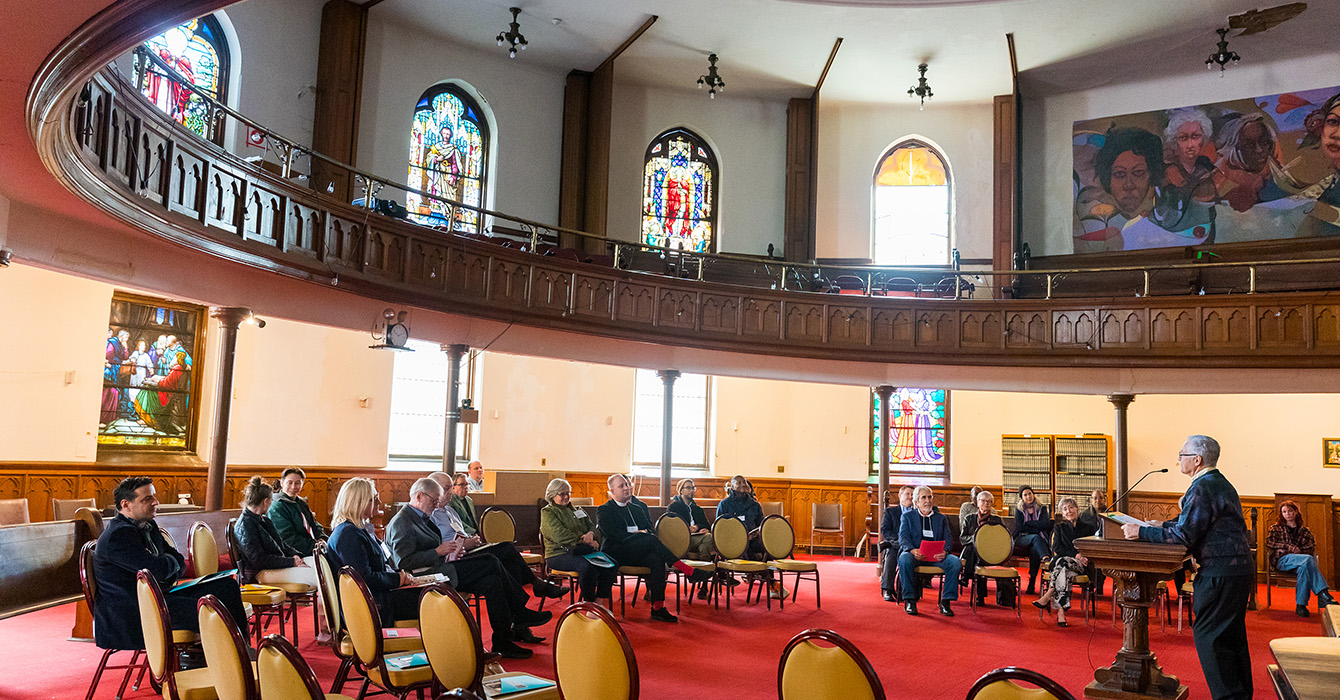Editor’s note: This article previously appeared on the Sustaining Pastoral Excellence website.
Wherever we look these days, we are increasingly aware of the need for excellence and the prevalence of mediocrity. Everywhere, it seems, a culture has emerged around leadership and excellence, focusing primarily on vocational and professional life. Institutions and structured programs are coming forth to advance excellence in many arenas, including religion.
But what, if anything, does God have to do with excellence in general and pastoral excellence in particular? At the core of Christian understanding is that God intends the healing, the salvation, of the entire universe. Creation has its origin and its consummation in God. Human beings are called to share in the healing, reconciliation, and transformation of all creation. That is our vocation. God, therefore, intends that all vocations, indeed, our very being, contribute to God’s finished creation.
Christian communities have this as their vocation: To be visible signs that point toward God’s intention for all humanity and to be instruments by which God’s telos for all creation is fulfilled. The Church exists in this world to point toward a new world God is bringing and to be in mission on behalf of God’s intention for the world. Pastoral excellence involves leading Christian communities to fulfill their vocation.
We all benefit from excellence, whether in medicine, education, the arts, engineering, government, communication, or other fields. Who does not want to be served by those who pursue and attain excellence? None of us wants to be treated by a physician who is content with mediocrity; neither do we want our children taught by mediocre teachers. We would like our buildings built by excellent builders. When it comes to our own performance, mediocrity may be acceptable; but when we are the beneficiaries of others’ skills and talents, we want excellence!
Yet, defining excellence is problematic, especially when it comes to pastoral excellence. What is excellent ministry? Having heard lay persons describe dozens of pastors as “excellent” or “effective,” I can testify to the subjectivity and even conflicting images of excellent ministry. Whether the description focuses on personal qualities or professional skills, there is not universal agreement.
Furthermore, it is difficult if not impossible to measure the results of specific pastoral tasks. There is no consensus, for example, as to what constitutes an excellent sermon. Who and what determines when a worship service is excellent? What is an excellent pastoral visit? Even less clear is what constitutes excellent leading of a congregation. The expectations of congregational excellence range from statistical growth to the transformation of persons and societies; but what kinds of growth constitute excellence and what are such transformed persons and societies to be and to do?
Excellence is living and serving in the light of God’s vision of a new creation. Excellence, therefore, is a process of growth toward God’s vision of wholeness, maturity, completeness. Excellence is a journey toward “the new heaven and new earth,” (Revelation 21:1) always celebrating the signs and present expressions of God’s reign while eagerly pursuing and hopefully anticipating the finishing of the new creation.
Excellence, then, has its origin in God. It is God’s reign over all creation brought near and made secure in Jesus Christ that defines and empowers all authentic excellence. What characterizes God’s reign? When God’s new creation, telos, comes to completion all creation will be healed, from the scarred majestic mountains to the microscopic cell, the depleted ozone and polluted air to the poisoned streams and diseased human minds. When God’s new world is finished, the human family will be one and barriers will crumble as each person is seen and treated as beloved daughters and sons of God, with infinite worth and dignity. Justice and righteousness will permeate all institutions and actions as the least and most vulnerable are enabled to reach their full potential as children of God.
Excellence, then, is being a sign and instrument by which creation is healed, reconciliation is experienced, and justice is practiced. Excellence in the pursuit of healing, reconciliation, and justice requires explicit theological vision, Christ-formed character, and skills that shape persons and institutions that approximate God’s reign of compassion, generosity, and joy.
Pastoral excellence includes announcing in word and deed God’s telos, inviting persons and communities to an identity and purpose rooted in God’s new creation, and leading congregations on their journey toward the new creation. Pastoral excellence includes character that reflects God’s reign and skills that facilitate God’s reign in the world. Therefore efforts to call forth, shape, and sustain pastoral excellence must be holistic.
Reading many of the 700 grant proposals submitted to Lilly Endowment Inc. for the sustaining of pastoral excellence and assisting in the coordination of the 63 programs that received grants raises a curious question in my mind: Is God necessary for sustaining pastoral excellence? Few proposals make explicit reference to how understanding and experience of God and the divine reign enable pastoral excellence.
Instead, the Sustaining Pastoral Excellence programs frequently refer to and use tools of the social sciences, best practices of business and corporate leadership, and educational theory and insights. That is as it should be! Resistance to excellence by clergy and failure to learn the best practices of the corporate world ignore that this is God’s world and God’s new creation comes through multiple avenues.
But to leave theology as an implied presence or presumed component of pastoral excellence is to assure the failure to sustain pastoral excellence. Assuming that pastors will bring the theological (God) dimension to the tools and insights of the social sciences and management could be deadly to the pastoral excellence we are seeking to sustain. No tools are value free or theologically neutral. Without persistently probing and making explicit the theological question -- “What does God have to do with excellence?”-- Sustaining Pastoral Excellence programs will fail to advance the excellence that God intends for creation. Without clear theological grounding, excellence in ministry will be an added burden to achieve rather than a gracious invitation to share in God’s excellence.
I had just graduated from seminary in the 1960s when “the death of God” controversy received widespread media coverage. On my way to the parsonage from visiting the hospital one afternoon, I was stopped by a neighbor. With considerable anger, he “demanded” that I do whatever I could to get Thomas Altizer fired from his faculty position at Emory University. He obviously had a grossly exaggerated image of this young pastor in the hills of East Tennessee.
After several minutes of listening to his hostile defense of God’s aliveness and denunciation of atheists, particularly one that taught at a church-related school, I simply asked him a question. “Let us just assume for the sake of argument that God is dead. What difference would that make in how you live the rest of this day?”
He paused, gave me an angry piercing look, and blurted out, “Hell, probably none!” Pointing to the distant heavens, he added, “But any fool knows there has to be SOMETHING UP THERE!” The SOMETHING UP THERE had little, if any, conscious effect on my neighbor’s values and actions.
Implied or presumed theology in the pursuit of vocational excellence, particularly pastoral excellence, may result in “improved means to unimproved ends.” And, SOMETHING UP THERE has no power to sustain anything, especially pastoral excellence.
Christian ministry clearly lives, and moves, and has its being in a particular God who was incarnate in Jesus Christ. Explicit awareness of who God is, what God is doing, and what God calls us to be and do provides the motivation, guidance, and sustaining power for ministry.
What does God, a particular God called Trinity, have to do with sustaining pastoral excellence? Everything! Excellence begins, continues, and ends in God!







